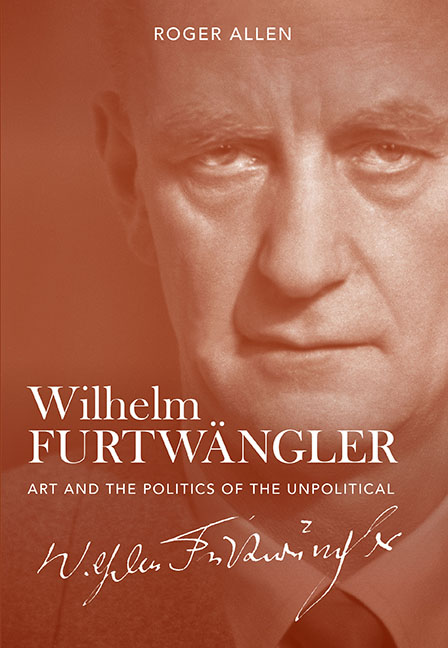Book contents
- Frontmatter
- Dedication
- Contents
- List of Illustrations
- List of Abbreviations
- Prelude
- Acknowledgements
- Preface
- Note on Translations
- Chronology
- Introduction
- 1 Wilhelm Furtwängler: The Historical, Cultural and Intellectual Background
- 2 Childhood and Youth (1886–1911)
- 3 Lübeck and Mannheim (1911–20)
- 4 Furtwängler in the Weimar Republic (1919–33)
- 5 Furtwängler and the Nazi State I (1933–35)
- 6 Furtwängler and the Nazi State II (1935–45)
- 7 Reflection and Reaction: Furtwängler in the Immediate Post-War Period (1945–50)
- 8 Furtwängler as Symphonist
- 9 ‘All Greatness is Simplicity’ (1951–54)
- 10 Afterword
- Appendix 1 Two Furtwängler Essays
- Appendix 2 Thomas Mann, ‘Germany and the Germans’ (1945)
- Appendix 3 Audio and Visual Sources
- Bibliography
- Index
8 - Furtwängler as Symphonist
Published online by Cambridge University Press: 17 July 2019
- Frontmatter
- Dedication
- Contents
- List of Illustrations
- List of Abbreviations
- Prelude
- Acknowledgements
- Preface
- Note on Translations
- Chronology
- Introduction
- 1 Wilhelm Furtwängler: The Historical, Cultural and Intellectual Background
- 2 Childhood and Youth (1886–1911)
- 3 Lübeck and Mannheim (1911–20)
- 4 Furtwängler in the Weimar Republic (1919–33)
- 5 Furtwängler and the Nazi State I (1933–35)
- 6 Furtwängler and the Nazi State II (1935–45)
- 7 Reflection and Reaction: Furtwängler in the Immediate Post-War Period (1945–50)
- 8 Furtwängler as Symphonist
- 9 ‘All Greatness is Simplicity’ (1951–54)
- 10 Afterword
- Appendix 1 Two Furtwängler Essays
- Appendix 2 Thomas Mann, ‘Germany and the Germans’ (1945)
- Appendix 3 Audio and Visual Sources
- Bibliography
- Index
Summary
Tonality is not the past but the future.
At this point it is appropriate to break off from tracing the progress of Furtwängler's thought through his writings and consider the significance and possible ideological implications of his return to active composition in the late 1930s when he was at the height of his prestige as conductor. Furtwängler is one of a significant group of composer/conductors that emerged in the immediate aftermath of Wagner. This was the age in which the workmanlike figure of the old-style court Kapellmeister (of which Hans Richter and Hermann Levi were among the last and most illustrious representatives) gave way to the figure of the star conductor as initially represented by Arthur Nikisch and later Arturo Toscanini. It is Nikisch and Toscanini, perhaps, who were the true precursors of the autocratic power-brokers of the podium later personified by Furtwängler's successor in Berlin: Herbert von Karajan. Furtwängler belonged to a much older tradition that traced its origins back to Wagner and even to Mendelssohn: artists in the broadest sense to whom the act of composition and performance were part of an indivisible creative process. Representatives of this tradition would include Weber as well as Mendelssohn; and then such luminaries as Hans von Bulow, to be followed by Gustav Mahler, Felix Weingartner, Richard Strauss, Hans Pfitzner, Alexander von Zemlinsky and Oskar Fried.
The young Wilhelm Furtwängler began to compose at a very early age; his first extant composition, Ein Stückche [sic] von den Tieren (A Little Piece about Animals) is dated 30 June 1893 and dedicated to his father. The manuscript sources of Furtwängler's entire output are all in the portion of the Furtwängler Nachlass held in the Zentralbibliothek Zurich. This collection contains the manuscripts of 120 compositions, ranging from an outpouring of youthful songs, piano pieces, choral works and so on, to three grandiose symphonies composed during the last fifteen years of his life. Furtwängler's earliest musical ambition was first and foremost to be a composer. He included a Symphonic Adagio in B minor of his own composition in his very first concert with the Kaim Orchestra of Munich in 1906; but as his career as a performer burgeoned from the time of his appointment in Lubeck onwards, his compositional ambitions were tempered by the increasing demands of his concert-giving activities.
- Type
- Chapter
- Information
- Wilhelm FurtwänglerArt and the Politics of the Unpolitical, pp. 187 - 202Publisher: Boydell & BrewerPrint publication year: 2018



